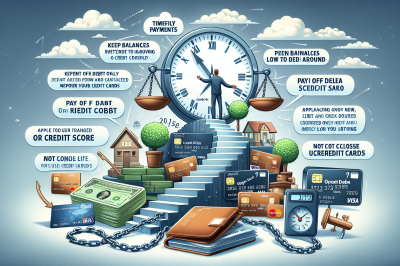Navigating the complex world of credit scores can be daunting, especially when you’re looking to make significant financial decisions. Your credit score is a crucial factor that lenders use to assess your creditworthiness, and it affects everything from the interest rates you receive to your eligibility for loans and credit cards. Understanding how to effectively elevate your credit score can open doors to better financial opportunities. In this article, we delve into the intricacies of credit reports and explore proven strategies that can help boost your credit score, setting you on a path to financial security and success.
Understanding Your Credit Report In-Depth
A credit report is a detailed record of your credit history, compiled by credit bureaus, and it is essential to understand each component of this document. The report includes your personal information, credit accounts (both active and closed), credit inquiries, and public records such as bankruptcies or foreclosures. Familiarizing yourself with these elements allows you to verify their accuracy and identify any discrepancies that could negatively impact your score. It’s advisable to obtain a free credit report annually from each of the three major credit bureaus: Equifax, Experian, and TransUnion, to keep a close watch on your financial standing.
In addition to identifying errors, understanding your credit utilization ratio — the amount of credit you’re using compared to your credit limit — is crucial. This ratio significantly affects your credit score; maintaining a ratio below 30% is generally favorable. For instance, if you have a credit card with a $10,000 limit, you should strive to keep your balance under $3,000. High credit utilization can signal to creditors that you’re a high-risk borrower, which can negatively impact your score.
Lastly, the length of your credit history also plays a significant role in your credit score. It accounts for the age of your oldest credit account, the age of your newest credit account, and the average age of all your accounts. Therefore, it’s beneficial to maintain older credit accounts as they provide a longer credit history, which can positively affect your score. Be cautious about opening new accounts too frequently, as this can lower the average age of your accounts and potentially reduce your score.
Implementing Proven Tactics to Boost Scores
One effective strategy for boosting your credit score is to ensure that you make all your credit payments on time. Payment history is the most significant factor affecting your credit score, accounting for 35% of the total score. Setting up automatic payments can help avoid late payments and the subsequent negative impacts on your score. Even if you encounter financial difficulties, contacting your creditors to negotiate alternative payment arrangements can prevent negative reporting to credit bureaus.
Another tactic is to diversify your credit portfolio. This involves having a mix of credit types, such as installment loans, credit cards, and retail accounts. Credit scoring models look favorably on a diverse credit file because it indicates that the individual can manage different types of credit responsibly. However, it’s crucial to only apply for new credit when necessary, as each credit inquiry can temporarily reduce your credit score by a few points.
Lastly, consider becoming an authorized user on a family member or friend’s credit card account, especially if they have a strong credit history. This can add a positive account to your credit report, thereby boosting your score. However, this strategy requires trust and responsibility, as the primary account holder’s credit habits will impact you. Ensure that the account you’re being added to is in good standing and has a history of on-time payments.
Improving your credit score is a strategic process that requires understanding, patience, and proactive management of your finances. By thoroughly understanding your credit report and adopting practical measures, you can significantly enhance your creditworthiness. Regular monitoring and timely adjustments in response to changes in your financial status are crucial to maintaining an upward trajectory in your credit score. Ultimately, an elevated credit score not only improves your chances of securing favorable credit terms but also positions you for financial stability and success. Remember, the path to a higher credit score is a marathon, not a sprint, and every step taken is a step towards achieving your financial goals.
